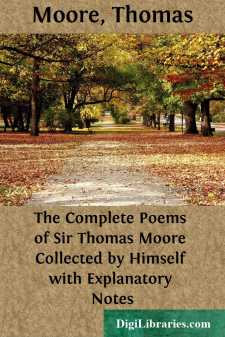Excerpt
THOMAS MOORE
Thomas Moore was born in Dublin on the 28th of May 1780. Both his parents were Roman-Catholics; and he was, as a matter of course, brought up in the same religion, and adhered to it—not perhaps with any extreme zeal—throughout his life. His father was a decent tradesman, a grocer and spirit-retailer—or "spirit-grocer," as the business is termed in Ireland. Thomas received his schooling from Mr. Samuel Whyte, who had been Sheridan's first preceptor, a man of more than average literary culture. He encouraged a taste for acting among the boys: and Moore, naturally intelligent and lively, became a favorite with his master, and a leader in the dramatic recreations.
His aptitude for verse appeared at an early age. In 1790 he composed an epilogue to a piece acted at the house of Lady Borrows, in Dublin; and in his fourteenth year he wrote a sonnet to Mr. Whyte, which was published in a Dublin magazine.
Like other Irish Roman-Catholics, galled by the hard and stiff collar of Protestant ascendancy, the parents of Thomas Moore hailed the French Revolution, and the prospects which it seemed to offer of some reflex ameliorations. In 1792 the lad was taken by his father to a dinner in honor of the Revolution; and he was soon launched upon a current of ideas and associations which might have conducted a person of more self-oblivious patriotism to the scaffold on which perished the friend of his opening manhood, Robert Emmet. Trinity College, Dublin, having been opened to Catholics by the Irish Parliament in 1793, Moore was entered there as a student in the succeeding year. He became more proficient in French and Italian than in the classic languages, and showed no turn for Latin verses. Eventually, his political proclivities, and intimacy with many of the chiefs of opposition, drew down upon him (after various interrogations, in which he honorably refused to implicate his friends) a severe admonition from the University authorities; but he had not joined in any distinctly rebellious act and no more formidable results ensued to him.
In 1793 Moore published in the Anthologia Hibernica two pieces of verse; and his budding talents became so far known as to earn him the proud eminence of Laureate to the Gastronomic Club of Dalkey, near Dublin, in 1794. Through his acquaintance with Emmet, he joined the Oratorical Society, and afterwards the more important Historical Society; and he published An Ode on Nothing, with Notes, by Trismegistus Rustifucius, D. D., which won a party success. About the same time he wrote articles for The Press, a paper founded towards the end of 1797 by O'Connor, Addis, Emmet, and others. He graduated at Trinity College in November, 1799.
The bar was the career which his parents, and especially his mother, wished Thomas to pursue; neither of them had much faith in poetry or literature as a resource for his subsistence. Accordingly, in 1799, he crossed over into England, and studied in the Middle Temple; and he was afterwards called to the bar, but literary pursuits withheld him from practicing....





